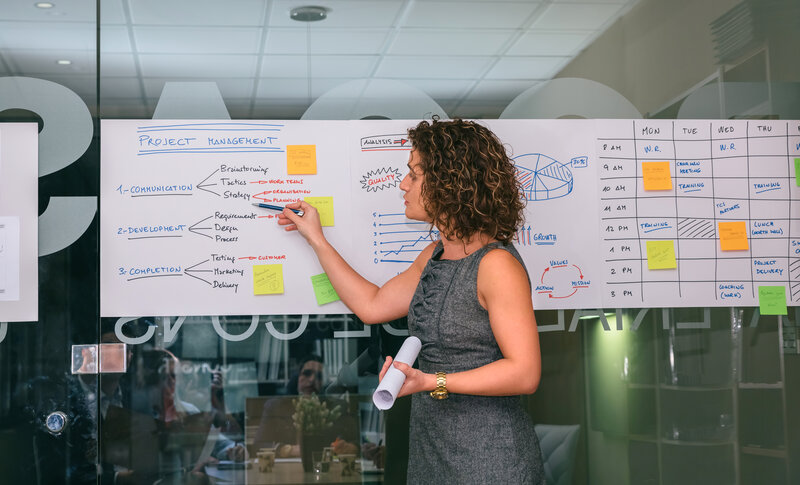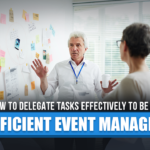
Time management is a skill in high demand in every field. For event marketers like you, it is particularly important to manage your limited time to achieve your event goals effectively. Implementing effective time management strategies can streamline your workflow, reduce stress, and improve results. You can segmentize, delineate, and prioritize your tasks into categories of importance, allowing you to be always free to focus on the important task at hand.
This guide will explore the 20 best practical time management tips for event planners that will enable you to achieve the best results.
Why Is Time Management Important For Event Planners?
Time management skills are essential for any event marketer planning and managing a B2B event. Any event requires months of careful planning and budgeting, from deciding the event objective to picking the right venue and working the crowd; all of these require collaboration and coordination among multiple teams that you, as an event planner, will have to direct. Therefore, having adequate time for each of those tasks will require careful time management so that you can manage these tasks effectively.
Effective time management can help you, as an event organizer, to dedicate your limited hours to essential tasks, thus saving you from getting overwhelmed and maintaining a healthy work-life balance.
Archana Jain, Consultant – Business Operation at Dell, articulates this point by saying, “Effective time management is not a one-time achievement but a continuous refinement process. It involves regularly assessing your strategies, adapting to new challenges, and making incremental improvements. The goal is not to reach a state of perfect time management but to develop habits and techniques that help you manage your time more effectively over the long term.”As such, let’s go through some of the best time management tips you can adopt for effective time management.
Best Time Management Tips For Event Planners
The following are the best time management tips for event marketers.
1. Establish Clear and Specific Goals
The most underrated yet one of the most essential time management tips for event planners while planning for an event is knowing your goals. The busiest event planners would understand that if you don’t have a clear and specific event goal in mind to direct your work, you’re bound to get sidetracked or distracted. That’s why setting a specific and actionable goal at the beginning of your event planning process allows you to align your tasks with the event objectives. Well-defined goals with clear boundaries help you stay focused without wasting your time and effort on unnecessary activities.
The best way to achieve optimum time management is to establish measurable goals for every phase or step of your event and then prioritize them based on the overall event’s core purpose. If you have a larger goal, you can break it down into smaller, manageable tasks for convenience and efficiency.
Loganathann Jayabalan, Personal Financial Consultant, iterates this point by saying, “Large tasks can feel daunting, so break them into smaller, manageable parts. Completing these smaller steps one by one will help you make steady progress and stay motivated.” By dedicating yourself to smaller and more manageable tasks, you avoid getting overwhelmed and instead feel motivated to complete them. Additionally, you should align your goals with key stakeholders to keep them in the loop. Finally, regularly review your goal to keep track of your work progress, stay focused, and prevent yourself from getting sidetracked.

2. Utilize Event Management Software
Proper utilization of event management software and other event tools can drastically reduce your planning time and automate mundane tasks, allowing you to focus on important tasks. Using the right tools will enable you to streamline your entire event processes and manage multiple tasks quickly and efficiently.
For instance, you can use event registration platforms to optimize your registration process, such as managing ticket sales, customizing registration forms, and collecting attendee data. Similarly, event management software can automate parts of your event by creating a virtual navigation system of your event venue or automatically sending out personalized thank-you emails and post-event surveys at the end of the event. The possibilities are endless when using event tools, allowing you, as an event planner, to dedicate your time to tasks that need your expertise.
Event technology and tools like Google Calendars can help you manage your event schedule by keeping track of important deadlines for various tasks and reminding you of them. They can also be integrated with your internal communication system to inform everyone about pending tasks and deadlines. You can even use task management tools to organize all your tasks under a single platform for convenience and to achieve a unified sense of organization. Project management tools like Asana, Trello, etc., can assist you in that and more by integrating more tools to free up your time.
All of these event tools and management software must be chosen carefully and aligned with your event management skills to meet your unique event requirements and your workflow because you want these tools to manage your limited time in the most efficient way possible. To know more about event management software, visit this article, “Top 27 Event Management Software for On-Site Event Efficiency”.
3. Be Realistic and Practical
Underestimating your event goals and tasks is one of the biggest impediments to achieving optimum time management. It’s easy to underestimate how long it will take to complete a task that you’ve never done before. Having a pragmatic outlook on your event goal will enable you to have a more realistic approach to your tasks. That’s why a clear and specific goal is important: it will show you a more realistic and actionable work plan to achieve that goal.
You can start being realistic about your work by estimating how long it will take to complete a task and then add 20% to that number. This will buffer you in case it takes longer than expected. Moreover, you can break down larger tasks into smaller, more manageable parts, making it easier to complete and estimate the completion time. This, perhaps, is one of the most practical time management tips for event planners.

4. Prioritize Critical Tasks
Prioritizing your important tasks is one of the major time management skills that all event planners should possess. This will ensure effective time spending and that high-impact tasks are completed first since focusing on the most critical tasks directly impacts your event’s success.
Start by identifying the most critical tasks that have a direct and maximum impact on the event’s success. Set deadlines and allocate adequate time and resources to complete that task. To perform those tasks promptly, you must avoid distractions by focusing on one critical task at a time and delegating the less important tasks to others. Lastly, the progress of the high-priority functions should be monitored to adhere to the schedule and meet the deadline.
5. Delegate Tasks to the Right People
The pressure to plan is evident as an event manager. However, to produce a successful event and pull it off within a set deadline, all the details cannot be left with just one person. Whether you’re handing off specific tasks to someone or distributing the workload with a well-qualified team of event planners, you need to delegate the relevant functions to the right people to manage time effectively.
Appropriately delegating tasks ensures the workload is equally distributed across the team with optimum efficiency. To begin with, you should delegate tasks to the right people with the required skill set and experience, thus ensuring that the task gets completed within due time. You can set clear expectations for the delegated functions with a set deadline so that the roles are specified. To ensure the expectations are met, you can use collaboration tools to track progress and regularly check in with your team to offer guidance. However, the most important thing is to trust your team to handle their assigned responsibilities without micromanaging.

6. Have a Backup Plan
You can plan for every intricate event detail and dedicate time and resources to fulfilling that detail. Still, even then, some unforeseen tasks can come up at the last minute and take longer than expected. These tasks, if not accounted for, can result in critical delays in your event planning process.
Therefore, an effective time management technique is to plan for the unknown and equip yourself and your team to handle unexpected tasks or circumstances at the last minute. These can be last-minute meetings, sick leaves, car trouble, traffic, etc. The best way to be prepared for these emergencies is to create a buffer time to address these unexpected events. For instance, you can block out your calendar once a week to address any last-minute changes or delays in specific tasks, allowing you to be prepared. This way, if something comes up, you don’t need to worry about meeting deadlines or delays.
Similarly, it’s always better to have a backup or a contingency plan to handle any unexpected events or changes. You can have a dedicated team to scout and identify any last-minute changes or delays and proactively address those issues. In this way, you are always prepared to meet deadlines and deliver a successful event.
7. Create an Event Roadmap
Creating an event roadmap is to lay out your work plan step by step so that you can stay focused on your tasks. Start by creating a daily, weekly, and monthly agenda personalized for your workflow and time. You can effectively manage your time and workload by taking a few minutes and thinking about what you need to do and when you need to do it.
The key is to be as specific as possible while creating your event roadmap because it’ll cater to your capabilities. Set realistic expectations and deadlines for your tasks that you can meet without getting overwhelmed or scrambling for extra time at the last minute.

8. Use Templates and Checklists
Using pre-made templates and checklists will save you time and ensure no task is forgotten. Templates for invitations, thank-you emails, event schedules, etc., allow you to complete repetitive tasks. Similarly, having a pre-made checklist that you can customize can save you time when making the entire structure and design of the checklist.
The best way to do this is to find a resource where you can get pre-made templates and checklists that can be customized for your needs. You can use templates for event planning and other itineraries, while you can use checklists for each event phase to ensure all the tasks are completed on time. These templates can be shared with your team and reused for future purposes, increasing efficiency and convenience.
9. Automate Routine and Repetitive Tasks
Automating routine and repetitive tasks through event automation tools can significantly reduce the time spent on repetitive tasks. This will enable you to focus on more critical tasks that require your attention and expertise. Better time management will be possible only if you can identify tasks that can be automated.
For example, you use email automation to send invitations, RSVPs, reminders, thank-you emails, etc. You can even automate certain parts of your marketing campaigns, such as social media posts leading up to the event. For the registration process, you can automate attendee communication, badges, tickets, etc. In short, the best way to manage time effectively is to focus on high-priority, high-impact tasks that need your expertise and time while identifying the repetitive tasks and leaving them for automation.

10. Be Flexible and Adaptable
Being flexible is the key essence to having an effective time management plan. When planning for an event, things are bound not to go as planned; in those cases, you can’t afford to be rigid. You need to adapt to the circumstances and manage your time accordingly.
For example, if an unforeseen task comes up, and you don’t attend to it while remaining struck to your fixed schedule, then that task will catch up to you and make you fall behind schedule eventually. The best time management technique is to analyze the situation, calm yourself, and proactively plan an alternative course of action to combat that challenge.
11. Minimize Distractions
Minimizing distractions is essential to manage your time effectively. Planning for an event requires focus, deep work, and creativity, all of which depend on your surrounding environment. You need an environment that nurtures your cognitive skills into action instead of impeding your planning process. Therefore, minimizing distractions is essential for you to focus on work and utilize your cognitive abilities without any hindrance.
The best way to minimize distractions is to activate ‘Do Not Disturb’ on all your electronic devices like smartphones, tablets, smartwatches, laptops, etc. This will give you time and space to do deep work without distractions.
Archana Jain explains how minimizing distractions can help with deep work, which involves hyper-focusing on important tasks without distractions using the 90-minute method. This method can be enacted by dedicating yourself to an important task for 90 minutes and then taking a proper break. Another way you can minimize distractions is to block your digital calendar. You can block off certain hours of the day to focus on your work and prevent others from reaching out to you in those hours. Most digital calendar platforms allow you to show your status for some time, and you can customize that status to reflect what you’re working on so that everyone knows you’re occupied with important tasks.

12. Stop Multitasking
While multitasking might seem an efficient way to complete all the tasks quickly, it almost always becomes counterproductive, leading to increased errors and decreased productivity. Handling multiple tasks simultaneously stresses your cognitive abilities and hampers your focus, leading to poor performance and more stress.
Instead, focus on one task at a time to achieve maximum productivity while maintaining good mental well-being. Manage your time accordingly to focus on a single task without distractions. This approach allows you to engage in deep work and leads to higher-quality outcomes. You can even start with high-impact tasks so as not to feel compelled to handle all the tasks simultaneously. To learn more about protecting your mental health from the overwhelming effects of multitasking, read this article, “20 Mental Health Tips for Event Planners That Will Help Keep Stress At Bay”.
13. Optimize Communication Channels
Efficient communication between team members, vendors, clients, and other stakeholders allows you to save time during the event planning and management process. One of the key reasons for delays in event planning is clarity and understanding of roles and responsibilities. If the tasks are not clearly defined and communicated to the person responsible for completing them, it can lead to unnecessary delays.
The best way to optimize communication among your team is to use one primary communication platform to avoid confusion. For instance, you can use Slack to communicate with your team, creating group emails and multiple channels to organize information. You can even automate Slackbot messages to update your team members on their pending tasks and deadlines. Lastly, all communication and shared resources should be backed up and documented for easy reference.

14. Organize and Track Deadlines Rigorously
Organizing and tracking your deadlines will ensure that your event planning stays on track. Set a clear timeline for every small and big task and rigorously monitor their progress to prevent delays. The best way to achieve that is to break your event timeline into different phases and assign deadlines for each phase. Next, you can use event management tools to create visual timelines for each task in a phase. This approach will allow you to review the timeline to identify potential delays regularly. You can even notify your team about any impending task or incoming deadlines to keep the overall event planning process on track.
15. Use Pre-Recording to Your Advantage
Hosting a live B2B event means everything must run smoothly, even if it’s challenging to handle. You cannot afford mistakes to show up at a live event broadcast, so the best way to alleviate such pressure is to pre-record some critical aspects of your event. Identify parts of the event, like specific sessions or presentations, that are vulnerable to unexpected accidents during live streaming and check if they can benefit from pre-recording.
Once you’ve identified those aspects of your event, utilize event management software to pre-record those presentations. You can even customize the look and feel of those sessions to make them feel completely integrated with the live-streaming experience. These platforms can allow you to showcase relevant on-screen information in the backdrop of a static banner or make essential announcements with a ticket banner. The better access to the latest technology, the less you worry about unforeseen incidents at your live B2B event.

16. Streamline Registration Procedures
Streamlining the registration process for attendees allows for smoother check-ins and a better overall experience. The quicker and more intuitive the registration process, the less time you need to waste handling issues. An optimized registration process can provide a hassle-free check-in and check-out experience for the attendees, reducing any complaints or issues you need to resolve, thus saving you time and resources.
The best way to achieve an optimal registration experience for your event is to utilize a good event registration platform. Ensure the platform has an integrated mobile app that your attendees can use for check-ins, leading to less gathering at the check-in counter. These platforms can also offer pre-event registration reminders and confirmations to streamline attendance and provide real-time event updates. Learn more about the best event registration platforms from our blog, “Top 20 Event Registration Platforms for Seamless Event Management in 2025”.
Additionally, you can save event coordinators a lot of time by posting clear signage and navigation charts at your event venue so attendees can find their way around it. This approach can drastically reduce any time spent dealing with attendees’ queries; instead, event coordinators can focus on managing the event.
17. Plan a Lean Event Marketing Campaign
An effective marketing campaign can attract attendees without consuming a lot of time. Marketing campaigns are required to spread awareness about your event and fill up the seats, but in most cases, they need more time and resources than they need. Therefore, focusing on the most impactful marketing strategies can allow you to manage time and resources more effectively.
The first step is to identify your most impactful and effective marketing channels like emails, social media, targeted ads, etc., and spend the most time and resources on those channels to attract your audience. You can even select a target audience base for a more concentrated effect of your marketing efforts. As a contingency plan, you should have backup suppliers, venues, and resources ready for unexpected challenges. Prepare and plan for any last-minute changes in the schedules of the speakers. Lastly, train your staff to handle any unexpected problems quickly and efficiently.
Visit our article “An Ultimate Guide To Understand Event Marketing on Social Media” to understand effective marketing strategies for your B2B event.

18. Review and Adjust the Event Plan Regularly
One of the most important time management tips for event planners is regular reviews of your event plan to ensure that you stay on track and adjust your workflows to meet the deadlines and goals of your event. This proactive approach lets you be ready for unexpected challenges or surprises at the last minute.
You can start by holding meetings with all the event stakeholders bi-weekly or weekly to review progress, address issues, and adjust workflows or timelines. Create a checklist to make sure everything is going according to the schedule. Be sure to monitor and identify any potential risk factors that can come up and delay your plans. Lastly, review all your vendor contracts and maintain regular communication to ensure all details are noted.
19. Implement Post-Event Surveys for Feedback
Collecting feedback after the event is essential to assess your performance and improve your future event planning. It is a time-efficient way to get insights into what worked and what didn’t. You can gather this information by deploying online surveys to your attendees for easy and quick feedback collection.
Design your post-event survey questions that give you the required information without overwhelming your attendees and consuming too much time. You can even offer incentives or gift cards for survey participation and as an expression of gratitude. For more in-depth information on post-event survey questions, read our blog, “53 Event Survey Questions For Maximum Responses”.

20. Use Event Analytics for Future Efficiency
After you’ve collected your survey responses, your next step is to use event data analytics to measure your current event’s success and create a base plan or framework for your future event. Collecting and analyzing data allows you to make informed decisions and saves much time that would’ve otherwise been spent on planning everything from the start. You can identify your key strengths and weaknesses with your feedback and start working on your pain points. To know more about event data analytics, read our article “How Event Data Analytics Can Help You Push Event Boundaries in 2024”.
A good tip for analyzing your event data is to look at the attendance numbers, engagement rates, and registration data. You can employ event software to assess the effectiveness of your marketing campaigns and which mode of marketing had the most impact on bringing in attendees. Measure your event ROI by tracking ticket sales, sponsorship deals, and other revenue sources. All of these will allow you to accurately understand your event’s success in a time-effective way while generating enough resources to help with your future event.
Key Takeaway
These are the best time management tips for event planners that you can utilize to ensure that your event goes smoothly without a hitch. Whether it is a virtual, in-person, or hybrid event, time management is essential to the event planning process. Adopt the tips above and choose what works best for your event and schedule since everyone has different dispositions. Every event planner has limited time to devote to their event, but make sure that you manage your time in such a way that you give time for yourself and can maintain a healthy work-life balance.
To learn more about the intricacies behind planning and executing a B2B event, visit Eventible to stay tuned for the latest updates.




Comments are closed.